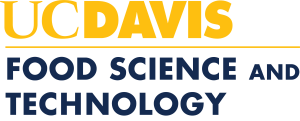A. Specific learning outcomes.
- Identify the important pathogens and spoilage microorganisms in foods.
- Identify the conditions under which the important pathogens are commonly inactivated, killed or made harmless in foods.
- Categorize virulence factors among pathogens
- Know the principles involving food preservation via fermentation processes.
- Compare the role and significance of microbial inactivation, adaptation and environmental factors (i.e., aw, pH, temperature) on growth and response of microorganisms in various environments.
- Discriminate between pre- and probiotic bacteria and the mechanisms by which they can improve health.
- Explain the functions of the indigenous intestinal microorganisms in human health and how their composition and functions relate to diet.
How this course addresses IFT Core Competencies:
Required course offered in the winter quarter of a student’s junior or senior year. FST104 is a 3 unit lecture course. FST104 builds on principles taught in FST50 and FST104L to meet the competencies in the Food Safety and Microbiology and Food Processing sections, while also addressing many of the Applied Food Science Skills and Success Skills (e.g. critical thinking/problem solving skills) required by IFT.
B. Tools used to assess program outcomes.
This course develops advanced-level understanding of microorganisms in foods and requires students to integrate knowledge accumulated through course instruction. Students prepare a summary of recent news articles involving food-associated microorganisms to help develop and reinforce a higher-level understanding. Assessment includes 5 in-class pop quizzes, two mid-term exams and a final exam to test knowledge. The final exam is cumulative and includes questions that require integration of knowledge of numerous concepts presented throughout the course (e.g. case studies on foodborne illness outbreaks caused by foodborne pathogens discussed in class).
C. Brief summary of assessment results to date.
Food Microbiology (FST104) is capped at 200 students and has maintained enrollment at that level for at least the past five years. The course is required for FST undergraduate majors and is an elective course for Microbiology, Biology, Viticulture & Enology, and other undergraduate departments. Approximately 30% of the students in the course are in the FST major. The course provides advanced- level knowledge of food microbiology and integrates both fundamental information along with recent advances in the areas of microbial pathogenesis, microbial food safety, and food fermentation and gut health. Each year students are asked to complete a course evaluation form for the course. The numerical scores using a scale of 1 (strongly disagree) to 5 (strongly agree) for specific questions as well as verbal comments are compiled. The course and the instructor are evaluated separately. The mean score for the course and instructor evaluation are 4.3 and 4.2, respectively. Students are asked to submit their own feedback on the course with suggestions for course and instructor improvement. These students’ assessments are studied carefully and new strategies are developed to deliver the course content in a more effective manner and to continue to improve and focus learning outcomes. Based on this feedback, lecture slides are now made available prior to class on the class website. Additional practice problems are provided to the students to support their learning of growth/death rate equations as well as thermal destruction kinetics.
Future plans: An introductory microbiology course is now a prerequisite for FST104 for incoming FST students. By having the students first take a general microbiology course, FST104 will be able to provide more advanced and integrated knowledge specifically on food microbiology. This change is expected to be implemented in the next 3 years.
